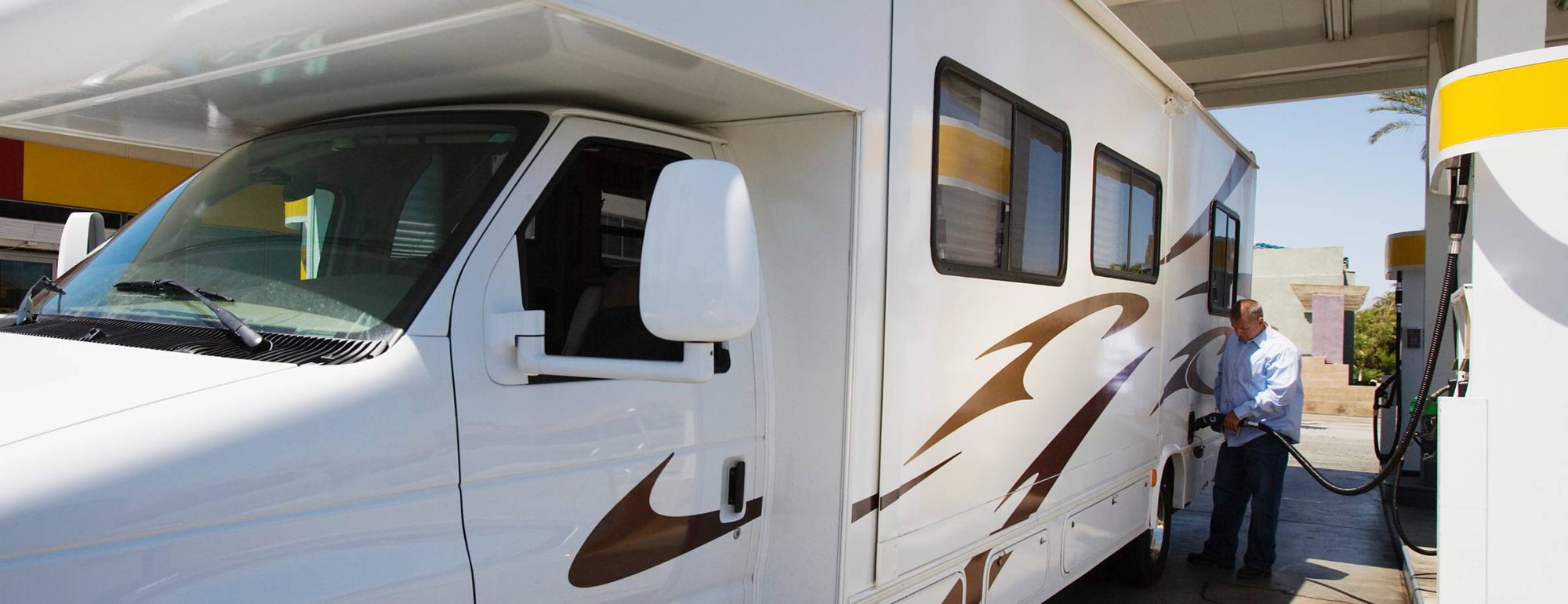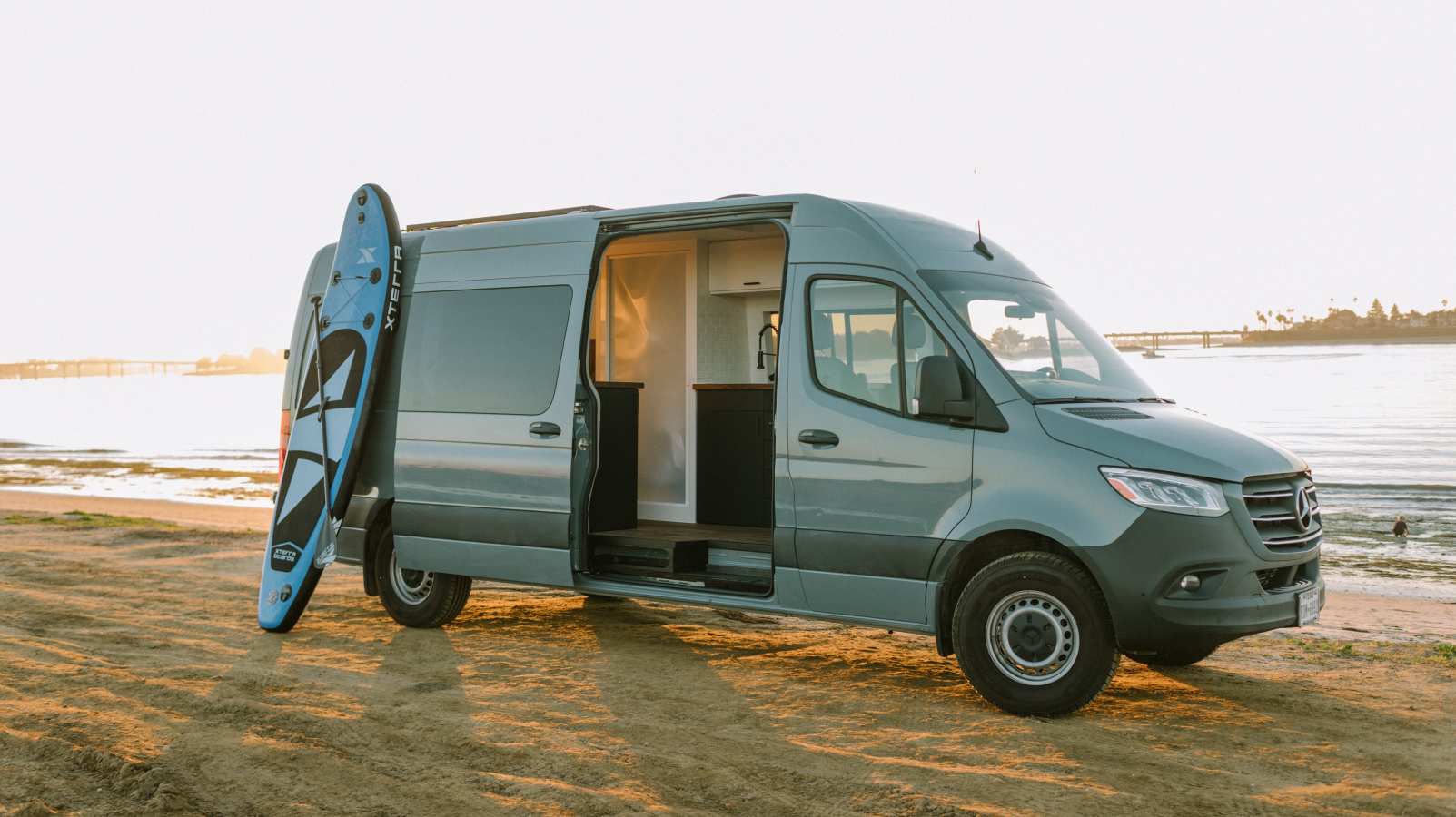RV ownershipRV maintenance and storage
Boost Your RV MPG: Best Tips & RVs for Fuel Efficiency
Posted on July 11, 2024

Curious about how to maximize your RV MPG? This guide will explain what impacts your fuel efficiency and offer practical tips to make every gallon count.
Key Takeaways
- Understanding RV MPG (miles per gallon) is essential for budget planning and enhancing travel efficiency, as it measures fuel efficiency based on distance traveled and fuel consumed.
- Different RV classes offer varying fuel efficiencies: Class A motorhomes average 6-8 MPG, Class B motorhomes 15-25 MPG, and Class C motorhomes around 9.5-10 MPG.
- Improving RV gas mileage involves regular maintenance, smart driving habits, and weight management, while trip planning and using fuel-efficient models and technology can further optimize fuel consumption.
Table of contents
- Understanding RV MPG
- Average gas mileage for different RV classes
- How to improve your RV's gas mileage
- Choosing a fuel efficient RV
- Planning your trip for better MPG
- Estimating fuel costs with an RV gas mileage calculator
- Summary
- Frequently asked questions

Understanding RV MPG
RV MPG, also known as miles per gallon, denotes the distance your recreational vehicle can cover using a single gallon of fuel. As it directly impacts the travel expenses, understanding this metric allows RV owners and renters to budget their trips more effectively. Knowing your RV’s gas mileage allows you to plan your journey better, ensuring that you can enjoy the ride without constant pit stops for refueling.
Several factors affect RV MPG, including:
- The vehicle’s weight
- Engine type
- Speed
- Driving conditions
Grasping these factors enables you to make educated decisions that can enhance your RV’s fuel efficiency. Let’s delve deeper into what RV MPG is and the various aspects that influence it.

Factors Affecting RV MPG
Several factors influence an RV’s gas mileage, starting with the vehicle’s weight. Heavier RVs consume more fuel, so reducing the overall weight can lead to substantial savings. This can be achieved by packing only essential items and avoiding traveling with full water tanks.

The engine type also significantly influences fuel efficiency. Diesel RVs typically achieve better fuel efficiency compared to gasoline models. This is because of their direct fuel injection and higher combustion efficiency. However, diesel fuel is typically more expensive, which can offset some of the efficiency benefits of a diesel RV.
RV MPG is also impacted by driving conditions and habits. Here are some tips to maximize fuel efficiency:
- Maintain an optimal speed of 55 to 60 miles per hour
- Avoid aggressive acceleration and deceleration
- Minimize driving into strong headwinds or on hilly terrain
- Take advantage of driving with a tailwind
Following these tips can help improve your RV’s gas mileage.
Average Gas Mileage for Different RV Classes
The gas mileage average for various RV classes fluctuates based on size, weight, and engine type. It’s vital to comprehend these differences to select a vehicle that best suits your needs. Generally, the larger the vehicle, the more fuel it will consume.
In this section, we’ll break down the average gas mileage for Class A, B, and C motorhomes, highlighting their specific characteristics and fuel efficiency. This information will help you make an informed decision when selecting an RV.
Class A Motorhomes

Class A motorhomes, being the largest and heaviest, typically have the lowest fuel efficiency. The average motorhome gas mileage for Class A motorhomes ranges from 6 to 8 MPG, with some models averaging around 8 MPG. These motorhomes are designed for luxury and space, which comes at the expense of higher fuel consumption.
Related: Simple Tips for Driving Large RVs
For those who prioritize comfort and amenities over fuel efficiency, Class A motorhomes are an excellent choice. However, if fuel economy is a significant concern, you might want to consider smaller, more fuel-efficient options such as:
- Class B motorhomes
- Class C motorhomes
- Travel trailers
These options offer a more compact and aerodynamic design, resulting in substantially better gas mileage and improved fuel efficiency.
Class B Motorhomes

Class B motorhomes, also known as camper vans, are the most fuel-efficient RVs. They offer an average MPG of 15 to 18, with some models reaching up to 25 MPG. Their smaller size, lightweight, and aerodynamic design contribute to their excellent fuel economy.
For those seeking a balance between comfort and fuel efficiency, Class B motorhomes are an ideal choice. These vehicles are perfect for shorter trips and easier to maneuver, making them a popular option among RV enthusiasts.
Class C Motorhomes

Class C motorhomes offer a middle ground between the large, luxurious Class A and the compact, fuel-efficient Class B. The average gas mileage for Class C motorhomes is around 9.5 to 10 MPG. They provide a good balance of space and fuel efficiency, making them a versatile choice for many RVers.
If you’re looking for a motorhome that offers decent fuel efficiency without sacrificing too much space and comfort, Class C motorhomes are worth considering. They provide a practical solution for families and groups who need more room than a camper van but want better gas mileage than a Class A motorhome.
Did you know? RVezy offers both RV rentals and sales, allowing you to try before you buy.
How to Imrpove Your RV's Gas Mileage
A blend of regular maintenance, intelligent driving habits, and efficient weight management can enhance your RV’s good gas mileage. These strategies can lead to significant fuel savings and enhance your overall travel experience.
Let’s explore these tips in detail.
Regular Maintenance
Consistent maintenance is key to improving gas mileage. Simple tasks like tune-ups, oil changes, and air filter replacements can improve fuel efficiency and fuel mileage by up to 20%. Dirty air filters and bad oxygen sensors can cause worse gas mileage by the same percentage, so keeping your RV in top condition is essential.

Moreover, checking and maintaining proper tire pressure can prevent unnecessary fuel consumption. By staying on top of these maintenance tasks, you ensure that your RV runs smoothly and efficiently.
Smart Driving Habits
Embracing intelligent driving habits can notably improve your RV’s fuel efficiency. Maintaining a consistent speed, ideally between 55 and 60 miles per hour, is one of the best ways to achieve better gas mileage. Utilizing cruise control on highways can help maintain this steady speed and reduce engine strain.
Avoiding aggressive acceleration and deceleration is also crucial for fuel economy. Smooth starts and stops, along with limiting idle time, can lead to substantial fuel savings. By incorporating these driving habits into your routine, you can enjoy more cost-effective and enjoyable trips.
Weight Management
Another efficient way to enhance fuel efficiency is by managing your RV’s weight. The heavier your vehicle, the more fuel it consumes. Reducing the amount of gear you carry and traveling as light as possible can save fuel.
Additionally, distributing the weight evenly throughout the RV can ease the strain on the engine and enhance fuel efficiency. By being mindful of what you pack and how you distribute it, you can achieve better gas mileage and enjoy a smoother ride.
Choosing a Fuel-Efficient RV
Choosing a fuel-efficient RV can notably cut down your travel expenses and lessen environmental impact. By choosing the right fuel efficient rv model and engine type, you can maximize your fuel efficiency and enjoy more economical trips.
Fuel-Efficient RV Models
Class B motorhomes, also known as camper vans, are among the most fuel-efficient RVs, averaging between 18 to 25 miles per gallon. Models like the Ford Transit and Ram ProMaster are particularly renowned for their excellent fuel economy, with the Ford Transit averaging 16 MPG and the Ram ProMaster around 15.5 MPG.

The Winnebago Travato is another fuel-efficient option, averaging 18 to 22 MPG. Renting an RV gives you the flexibility to choose the most fuel-efficient model available, ensuring you get the best gas mileage for your trip.
Diesel vs. Gasoline Engines
Diesel engines generally offer better fuel efficiency compared to gasoline engines, with diesel RVs averaging 7 to 12 MPG versus the average RV gas mileage of 6 to 10 MPG for gas RVs. However, diesel fuel is typically more expensive, which can offset some of the efficiency benefits.
While diesel engines might have higher upfront costs, they often provide better long-term fuel economy due to their higher combustion efficiency and direct fuel injection. When choosing between diesel and gasoline engines, consider both the initial cost and the long-term fuel savings to make an informed decision.
Planning Your Trip for Better MPG
Strategic trip planning can significantly enhance your RV’s fuel efficiency. By carefully selecting your routes and using technology, you can minimize fuel consumption and reduce travel costs.
Route Planning

Effective route planning helps avoid unnecessary driving and detours, which can save fuel and time. Choosing routes with minimal elevation gain and fewer stops can significantly improve gas mileage.
Some tips for maximizing fuel efficiency while traveling are:
- Traveling during off-peak times to avoid traffic
- Maintaining a steady speed
- Planning your route ahead of time to enjoy a smoother and more efficient journey.
Using Technology
Using technology like RV-specific GPS systems and apps can help find efficient routes and real-time fuel cost adjustments. Apps like Gas Buddy can help you locate the cheapest gas stations along your route, saving you money on fuel.

RV-specific GPS systems can also guide you to routes with fewer stops and less traffic, improving your overall fuel efficiency. By leveraging these technological tools, you can make your trips more cost-effective and enjoyable.
Estimating Fuel Costs with an RV Gas Mileage Calculator
Using an RV gas mileage calculator to estimate fuel costs is a pragmatic approach to budgeting your trips. These calculators can provide precise estimates by customizing calculations based on specific RV mileage and current gas prices.
How to Use an RV Gas Mileage Calculator
When using an RV gas mileage calculator, follow these steps:
- Input the total distance of your journey.
- Input your RV’s fuel efficiency (in miles per gallon).
- Input the current or average gas price.
- The calculator will then estimate your fuel expenses, helping you plan your budget more accurately.
Using these tools can provide instant estimates and help you manage your travel finances more effectively, ensuring a smoother and more predictable journey.
Factors to Consider
Considerations when estimating fuel costs should include fluctuating fuel prices, trip length, and changes in MPG due to driving conditions and maintenance. Tools like GasBuddy can help you find the best fuel prices along your route, further optimizing your fuel budget.
Understanding these factors will allow you to make more accurate estimates and prepare financially for your RV trips, ensuring you enjoy every mile without worrying about unexpected fuel expenses.
Summary
In summary, boosting your RV’s fuel efficiency involves a combination of choosing the right vehicle, maintaining it properly, adopting smart driving habits, and planning your trips effectively. By understanding and improving your RV’s gas mileage, you can enjoy more cost-effective and environmentally friendly travels.
Remember, every little bit helps. From selecting a fuel-efficient RV model to using an RV gas mileage calculator, these steps will ensure that you get the most out of every gallon. Happy travels, and may your journey be as smooth and efficient as possible!
Frequently Asked Questions
What is RV MPG and why does it matter?
RV MPG stands for Recreational Vehicle Miles Per Gallon and it matters because it helps RV owners and renters budget for their trips by understanding fuel consumption.
What factors affect my RV's gas mileage?
The weight of your RV, engine type, travel speed, driving habits, and driving conditions such as headwinds and terrain all affect your RV's gas mileage. These factors play a significant role in determining the fuel efficiency of your vehicle.
Which RV class offers the best fuel efficiency?
Class B motorhomes, also known as camper vans, typically offer the best fuel efficiency, averaging between 15-18 MPG. This makes them a great choice for those prioritizing fuel savings.
How can I improve my RV's gas mileage?
To improve your RV's gas mileage, focus on regular maintenance, adopt smart driving habits, and manage the weight of your RV. These steps can contribute to better fuel efficiency.
How do I estimate fuel costs for my RV trip?
To estimate fuel costs for your RV trip, use an RV gas mileage calculator and input your trip distance, RV's fuel efficiency (MPG), and the current gas price. This will give you an estimate of your fuel expenses.